What are the most commonly misspelled words in American English? The unpredictable spelling system in English makes it difficult and confusing, especially for non-native speakers, which leads to a large number of misspelled words.
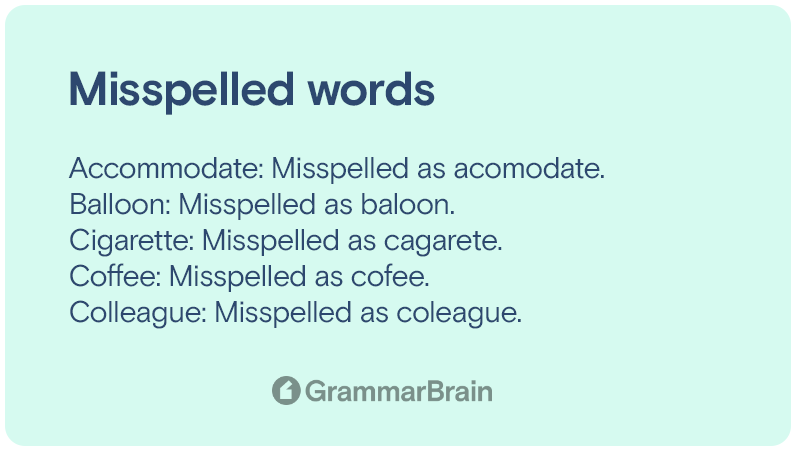
Why are some words commonly misspelled?
Differences in pronunciation and spelling
Some words are pronounced differently than their spelling. While pronunciation is the verbal structure of the word, spelling is the visual structure of the word. Dissonances in these can create confusion and lead to misspellings.
Examples
Colonel
The word colonel used to depict an officer rank in the army is pronounced as kur-nuhl, exactly like the word kernel.
Sew
The word ‘sew’ means stitching or weaving using threads and needles. The word is pronounced as ‘sow’.
Hyperbole
Hyperbole is a word used to denote an obvious or extremely exaggerated statement. It is borrowed from the Greek word huperbolḗ via Latin and has the irregular pronunciation, ‘hai-pur-buh-lee’.
Lingerie
The word denoting women’s clothing and innerwear is borrowed directly from the French. Americans pronounce it as lahn-zhuh-RAY.
Silent letters
Some words have silent letters i.e. they are not heard when said out aloud making room for spelling errors.
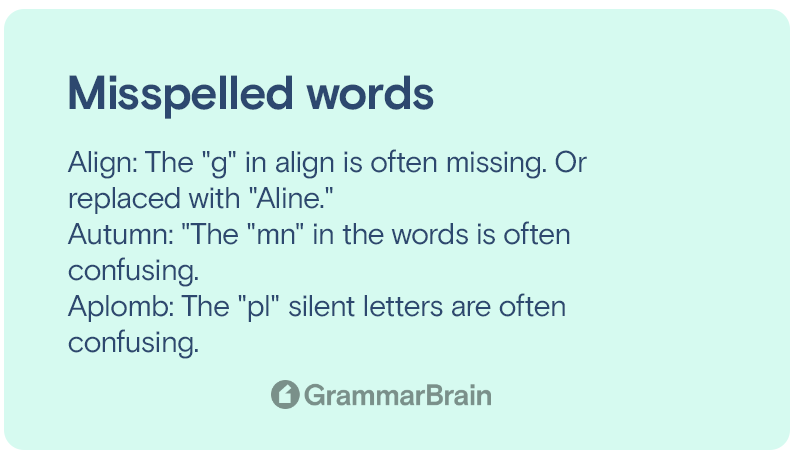
Examples
- Align: The “g” in align is often missing. Or replaced with “Aline.”
- Autumn: “The “mn” in the words is often confusing.
- Aplomb: The “pl” silent letters are often confusing.
- Ascent: The “sc” combination can get misspelled easily.
- Bridge: With the “dg” being silent, often misspelled as “Brige.”
- Cologne: The “gn” combination can get confusing.
- Champagne: Similar to “cologne,” the “gn” combination is confusing.
- Debt: The “bt” combinations are challenging to remember.
- Doubt The “bt” combination is challenging to remember.
- Feign: With the “gn” silent letters getting confused.
- Gnaw: “Gn” in “gnaw” can get misspelled as “naw.”
- Numb: The “mb” combination as “num.”
- Resign: “The “gn” combination being confusing.
- Subtle: More “bt” silent letters.
- Womb: The “mb” in womb being highly confusing.
Double/repetitive letters
Some words have one or more repetitive letters occurring together which makes it easy to misspell.
Examples
- Accommodate: Misspelled as acomodate.
- Balloon: Misspelled as baloon.
- Cigarette: Misspelled as cagarete.
- Coffee: Misspelled as cofee.
- Colleague: Misspelled as coleague.
- Committee: Misspelled as comitee.
- Harass: Misspelled as harass.
- Embarrass: Misspelled as embaras.
- Exaggerate: Misspelled as exagerate.
- Recommend: Misspelled as recomend.
- Recurring: Misspelled as recuring.
- Trellis: Misspelled as trelis.
- Underrate: Misspelled as underate.
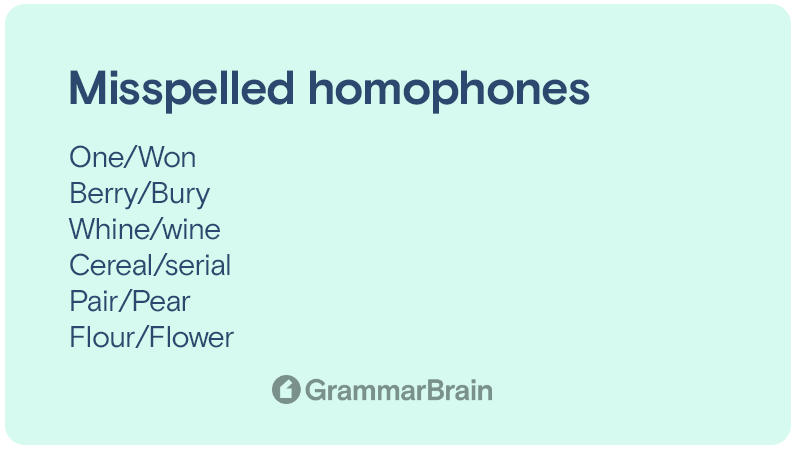
Homophones
Homophones are words that sound the same but have different meanings and spellings.
Examples
- One/Won
- Berry/Bury
- Whine/wine
- Cereal/serial
- Pair/Pear
- Flour/Flower
Proper nouns
Names of people, places, brands, etc. can sound different than the way they appear.
Names
- Reagan (not Raygan/Rhaygun)
- Louis (Not Luwis)
- Madeleine (Not Madalin)
- Arianna (Not Ariana)
- Sean (Not Shaun)
- Geoffrey (Not Joffrey)
- Graham (Gram and not GraHam)
Brand names
Some brands have willfully changed their spellings for impact, uniqueness, or emphasis.
Examples of brands with modified spelling:
- Fiverr
- Flickr
- Wrogn
- Diggz
- Tumblr
But some brand names have been commonly misspelled due to their foreign origin.
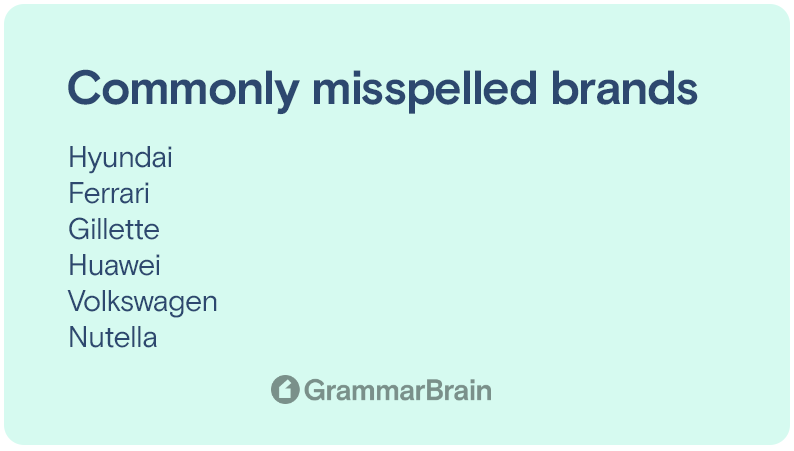
These are:
- Hyundai
- Ferrari
- Gillette
- Huawei
- Volkswagen
- Nutella
- Lamborghini
- Fedex
- Bugatti
- Dolce & Gabbana
- Porsche
Differences between UK and US spelling
Though UK and US English share a common language, you may wonder why they have different spellings.
The standardized spellings of English came about only in the late 18th century. The Johnson’s Dictionary (1775) cemented the current UK spelling by contending that the spelling should be dependent on the origin word.
But Noah Webster’s Dictionary (1783) introduced changed spellings in US English motivated by the need to make it easier to learn. This emphasis on phonetic spellings led to dropped letters, transposed letters, etc.
Let’s see some examples of varied spelling in UK and US English.
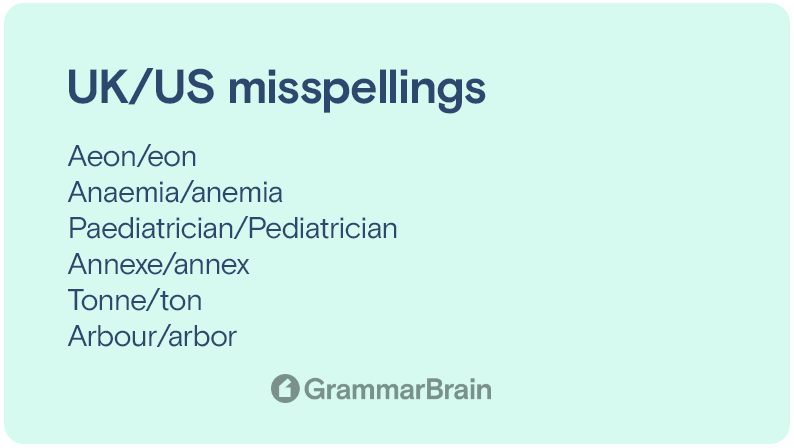
Examples of dropped letters
US English has dropped redundant letters in spellings to make them closer to phonetic spellings.
UK/US
| UK/British English | American English |
| Aeon | Eon |
| Anaemia | Anemia |
| Annexe | Annex |
| Tonne | Tone |
| Arbour | Arbor |
| Colour | Color |
| Aeroplane | Airplane |
| Plough | Plow |
| Sulphur | Sulfur |
| Doughnut | Donut |
Examples of transposed spellings
Some letters are transposed in the spellings of US English to make it closer to its pronunciation.
UK/US
| UK/British English | American English |
| Metre | Meter |
| Theatre | Theater |
| Fibre | Fiber |
| Lustre | Luster |
| Calibre | Caliber |
Examples of double consonants
UK/US
| UK/British English | American English |
| Appal | Appall |
| Enrol | Enroll |
| Dishevelled | Disheveled |
| Distil | Distill |
| Counsellor | Counselor |
| Fulfil | Fulfill |
| Skilful | Skillful |
Examples of changed letters
The US English favors the use of ‘z’ instead of ‘s’ historically.
UK/US
| UK/British English | American English |
| Criticise | Criticize |
| Organise | Organize |
| Recognise | Recognize |
| Authorise | Authorize |
| Sympathise | Sympathize |
| Analyse | Analyze |
Since both variants are correct but restricted to the respective regions, it is important to maintain uniformity in spelling rules for consistency.
Commonly confused words
Some words in English may sound the same though they have entirely different meanings and spelling.
- accept/except
- advice/advise
- affect/effect
- allusion/illusion
- allude/elude
- assent/ascent
- complement/compliment
- counsel/council
- conscious/conscience
- dependant/dependent
- discrete/discreet
- elicit/illicit
- imminent/immanent
- farther/further
- forward/foreword
- license/license
- practice/practise
- proceed/precede
- principle/principal
Commonly misspelled words in English
Here’s a list of frequently misspelled words in English due to their irregular pronunciation, emphasis, silent letters, or double letters.
- Accede
- Acknowledgment
- Almond
- Amateur
- Amethyst
- Ascend
- Asterisk
- Asylum
- Atheist
- Believe
- Bureau
- Bury
- Business
- Calendar
- Chaos
- Chief
- Coffee
- Colleague
- Colonel
- Committee
- Connoisseur
- Conscientiously
- Debt
- Delinquent
- Doubt
- Drunkenness
- Ecstasy
- Effervescence
- Entrepreneur
- February
- Gauge
- Gnash
- Guarantee
- Harassment
- Haughty
- Hierarchy
- Hyperbole
- Inconvenience
- Irresistible
- Jeopardy
- Leisure
- Liaison
- Lightning
- Lingerie
- Mellifluous
- Mischievous
- Obeisance
- Occurrence
- Perjury
- Perseverance
- Personnel
- Playwright
- Preferred
- Prejudice
- Privilege
- Process
- Professor
- Pronunciation
- Psychic
- Quarantine
- Questionnaire
- Quintessential
- Recommend
- Recurring
- Renaissance
- Resplendent
- Restaurant
- Rhapsody
- Rhythm
- Rotisserie
- Schedule
- Scissors
- Separate
- Sew
- Solder
- Success
- Symphony
- Vacuum
- Viscount
- Wantonly
- Wednesday
- Weird
Inside this article
Fact checked:
Content is rigorously reviewed by a team of qualified and experienced fact checkers. Fact checkers review articles for factual accuracy, relevance, and timeliness. Learn more.
Core lessons
Glossary
- Abstract Noun
- Accusative Case
- Anecdote
- Antonym
- Active Sentence
- Adverb
- Adjective
- Allegory
- Alliteration
- Adjective Clause
- Adjective Phrase
- Ampersand
- Anastrophe
- Adverbial Clause
- Appositive Phrase
- Clause
- Compound Adjective
- Complex Sentence
- Compound Words
- Compound Predicate
- Common Noun
- Comparative Adjective
- Comparative and Superlative
- Compound Noun
- Compound Subject
- Compound Sentence
- Copular Verb
- Collective Noun
- Colloquialism
- Conciseness
- Consonance
- Conditional
- Concrete Noun
- Conjunction
- Conjugation
- Conditional Sentence
- Comma Splice
- Correlative Conjunction
- Coordinating Conjunction
- Coordinate Adjective
- Cumulative Adjective
- Dative Case
- Determiner
- Declarative Sentence
- Declarative Statement
- Direct Object Pronoun
- Direct Object
- Diction
- Diphthong
- Dangling Modifier
- Demonstrative Pronoun
- Demonstrative Adjective
- Direct Characterization
- Definite Article
- Doublespeak
- False Dilemma Fallacy
- Future Perfect Progressive
- Future Simple
- Future Perfect Continuous
- Future Perfect
- First Conditional
- Irregular Adjective
- Irregular Verb
- Imperative Sentence
- Indefinite Article
- Intransitive Verb
- Introductory Phrase
- Indefinite Pronoun
- Indirect Characterization
- Interrogative Sentence
- Intensive Pronoun
- Inanimate Object
- Indefinite Tense
- Infinitive Phrase
- Interjection
- Intensifier
- Infinitive
- Indicative Mood
- Participle
- Parallelism
- Prepositional Phrase
- Past Simple Tense
- Past Continuous Tense
- Past Perfect Tense
- Past Progressive Tense
- Present Simple Tense
- Present Perfect Tense
- Personal Pronoun
- Personification
- Persuasive Writing
- Parallel Structure
- Phrasal Verb
- Predicate Adjective
- Predicate Nominative
- Phonetic Language
- Plural Noun
- Punctuation
- Punctuation Marks
- Preposition
- Preposition of Place
- Parts of Speech
- Possessive Adjective
- Possessive Determiner
- Possessive Case
- Possessive Noun
- Proper Adjective
- Proper Noun
- Present Participle
- Prefix
- Predicate



